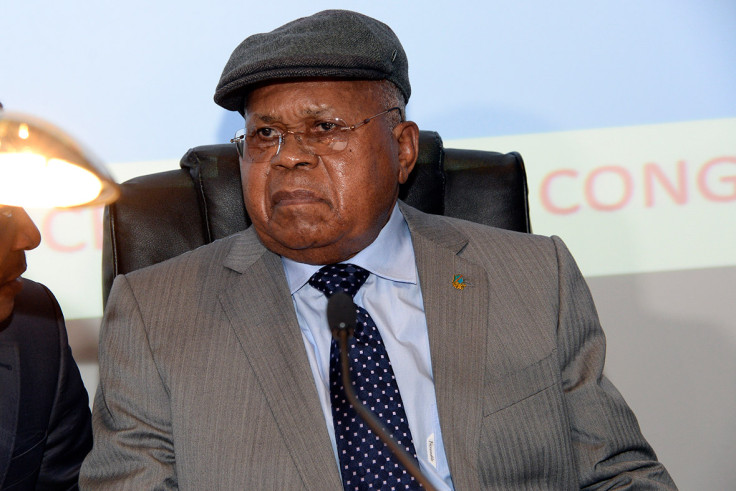Etienne Tshisekedi's opposition eyes 'transitional government' if Kinshasa fails to call elections
Electoral Commission supposed to call presidential elections on 19 September.
A day after veteran opposition leader Etienne Tshisekedi returned to the Democratic Republic of Congo (DRC) following a two-year convalescence in Belgium, Congo's first organised opposition platform – which he helped form – is preparing for the next step.
His return comes as the country heads into fresh turbulence. The Congolese people are expecting presidential elections in November 2016, but a number of signs appear to suggest that the current president, Joseph Kabila, is seeking to hold on to power beyond his mandate. Under the current Congolese constitution, presidents can only serve a maximum of two terms.
In June, Tshisekedi gathered Congo's fractured opposition in Genval on the outskirts of Brussels, Belgium, in an unprecedented attempt to agree on a common strategy to oust Kabila. During the meeting – dubbed 'Conclave' – the parties forged an alliance, the Rassemblement ("Rally", in French).
In mid-June, the Rassemblement met with an international panel, which included the African Union, European Union, International Organization of the Francophonie and two sub-regional organisations, the Southern African Development Community and International Conference on the Great Lakes Region and Edem Kodjo, former Prime Minister of Togo who the African Union appointed to lead the mediation in the DRC.
Rassemblement's conditions to attending national dialogue
"We raised all these [judicial] hassles and submitted our roadmap to the international community which was asking us to participate in the national dialogue (to bring political consensus) according to the United Nations's resolution 22-77 (2016)," Raphael Katebe Katoto, a politician and member of the Rassemblement, told IBTimes UK.
"That [participating in the dialogue], we agree, but there are prerequisites for us attending if Kabila is 'willing' to attend: how does one explain that he wants to attend this dialogue, how come he is arresting the very same people he is supposed to dialogue with."
While leaders of the Rassemblement said they would go to the political dialogue, the platform says its prerequisites include the release of all political prisoners, end "judicial pursuits" against political opponents and liberate the media.
"If those prerequisites are respected, then we'll go to the dialogue," Katebe Katoto, who is presidential candidate Moise Katumbi's brother, said, before claiming: "But he [Kabila] doesn't want the dialogue, as he is already eyeing his Plan B, the use of strength – we know this and the international community, during our meetings, has told us we must be vigilant because he may use force. But we are not scared of his Plan B, because our arms, our army is the population. Let's see if he decides to shoot at one million or two million Congolese who will go out in the streets."

In time for the elections?
On Sunday 31 July, Tshisekedi is expected to hold a large rally, during which the veteran will demand, in the name of the Rassemblement, that the electoral commission (CENI) calls for the presidential elections on 19 September – 90 days before the end of the president's mandate – as stipulated in the Constitution.
If the CENI fails to call for the elections on time, however, IBTimes UK understands that the Rassemblement will "take its responsibilities with the people".
A source, which participated in the opposition platform's recent meeting, explained: "If the regime in place, which has the mandate and duty to organise the elections, has not been able to organise them for five years while everything was planned, we will ask them to relinquish power and we will set up a transitional government that will organise the elections in due form.
"The transitional government will not include those in power."
Kodjo, who quoted the UN Resolution 22-77 earlier this week in a seeming allegation that Tshisekedi may be obstructing the search for a negotiated solution to the political-electoral crisis in the country, will launch the work of the Preparatory Committee this weekend.
Etienne Tshisekedi's 'successful' return
On 27 July, hundreds of thousands rapturously welcomed the politician at N'Djili international airport in Kinshasa, and other cities such as Mbuji-Mayi (Kasaï-Oriental) where opposition supporters had gathered for a "virtual" welcome at Bipemba airport.
Tshisekedi return had been repeatedly postponed since he left for Belgium in August 2014 to receive medical treatment.
Similar celebrations were prohibited in Kananga (Kasaï-Central) and in Tshikapa (Kasaï), according to Radio Okapi – the UN radio station in the DRC.
Meanwhile, pro-government local leaders had also organised marches "in support of the national dialogue and its facilitator" in a number of cities including Gbadolite (Nord-Ubangi), and Mbuji-Mayi.
© Copyright IBTimes 2025. All rights reserved.






















